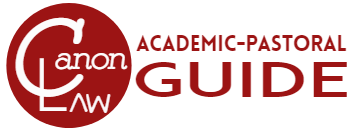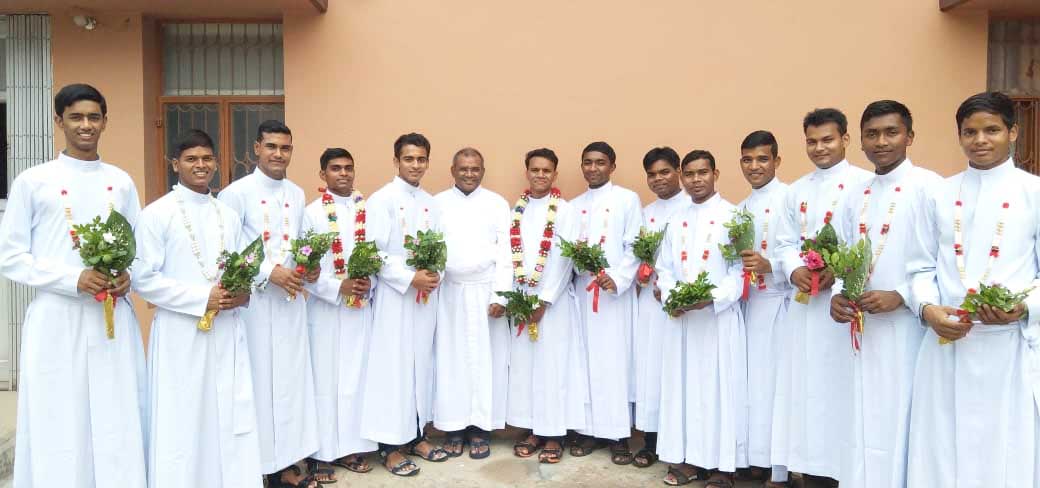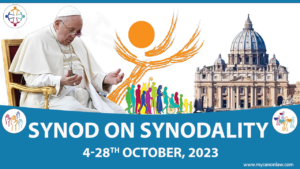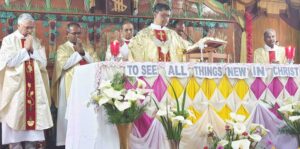We often hear about the use of the term «vow» in our life, such as a vow to fulfil certain obligation or duty. In the Catholic Church, there are members of the Institutes of Consecrated Life and Societies of Apostolic Life who make the vows of chastity, poverty and obedience. How do we understand a vow exactly?
If we look at the etymology, we find that the use of the term «vow» comes from the Latin neuter noun votum which means – «a promise», «a dedication», «a vow», or «a solemn pledge». The noun votum is derived from the second declension Latin verb voveō, vovēre, vōvī, vōtum, meaning – «I vow», «I dedicate», «I promise», or «I devote to a deity». Hence, making a vow or taking a vow entail in fulfilling certain obligations and duties intended for something good in a person’s life.
A vow in the Code of Canon Law 1983
The Code of Canon Law 1983 is the universal and official law of the Catholic Church. Canon 1191 §1 of the Code of Canon Law defines a vow in the following words: «A vow is a free and deliberate promise made to God about something which is possible and better. The virtue of religion requires that it must be fulfilled». One may ask a further question: «Who can make a vow?». We find the answer in the same canon 1191 §2 which says that «all who possess the suitable use of reason are capable of making a vow unless they are prohibited by law». Since the Code of Canon Law concerns the members of the Latin Catholic Church, it implies that all the baptized faithful [can. 96] who have sufficient use of reason [can. 97], meaning above the age seven, can lawfully and validly make a vow. A vow has a binding force and it entails a juridical effect in law when it is properly made and received by a competent authority designated. Hence, by its very nature, it obliges the person one who makes it [can. 1193].
The Code of Canon Law distinguishes vows in the following classifications:
- Public vow: According to canon 1192 §1, a vow is said to be public if a legitimate Superior accepts it «in the name of the Church» [= in nomine Ecclesiae]. However, it is to be remembered that the clause in nomine Ecclesiae refers only to the type of vow which characterizes it to be public. Hence, a vow will be called public if it is received «in the name of the Church» by the competent ecclesiastical authority even if it has not been made in the presence of a larger number of faithful.
- Private vow: The same vow as stated above is said to be private if it is made privately whether or not a legitimate Superior accepts it. However, if a legitimate Superior accepts it, he does not accept it «in the name of the Church» [= non in nomine Ecclesae]. This criterion to distinguish between a public and private vow base on the clause in nomine Ecclesiae is not clear because in the Church there are some Secular Institutes and Associations of Faithful whose members make a private vow but are accepted by a legitimate ecclesiastical authority who acts «in the name of the Church» [in nomine Ecclesiae]. Some canonist term the vow made by the members of the Secular Institute as «semipublic vow».
- Solemn vow: The Code of Canon Law does not elaborately discuss on the distinctions between a solemn and simple vow. Rather, it leaves the task on the particular law of the Institutes to decide based on the mind of the founders, their sound traditions, their nature, character, and spirit. As per canon 1192 §2, a vow is said to be solemn if the Church has recognized it as solemn; and if the Church does not recognize it as solemn, it is simple. Obviously, this recognition by the Church through the Apostolic See is based on the sound tradition, historical context, mind and project of the founder, nature, character, and spirit of each Institute of Consecrated Life whose particular laws have been approved by the competent ecclesiastical authority.
- Simple vow: A vow is said to be «simple» if the Church does not recognize it as solemn. One may ask question again – what is it that serves as a criterion to distinguish a vow as solemn? The answer is – the mind of the founder, sound tradition of the Institute, nature, character and spirit of the Institute. It is important to remember that though the Code of Canon Law maintains the distinction between the solemn and simple vows, it no longer any explicit distinction on the juridical effects that proceed from them.
- Personal, Real or Mixed vow: In canon 1193 §3, a vow is further classified into «personal», «real» and «mixed» based on the objects of vows. At first, a vow is said to be «personal» if the person making the vow promises an action. Here, the object of vow is an «action». For example, a person who makes a vow to go for a pilgrimage to the shrine of Our Lady of Lourdes – will come under a personal vow. Another example of personal vow is – a person making a vow to fast on certain days of the week. Secondly, a vow is said to be «real» if the person making the vow promises a thing, which serves as an object of the vow. For example, a person who makes a vow of giving a donation of property or land to a Religions Institute or to the Church. The real vow has a binding force on the person to give a thing which is real. Thirdly, a vow is classified as «mixed» if it shares the nature of two or more of the abovementioned classifications, that is, if a vow includes the characteristics of «personal» as well as of «real» will be called a «mixed vow». The example for a mixed vow is – a person who makes a vow to go on a pilgrimage to the shrine of our Lady of Lourdes, and to give a contribution of funds for the construction of a new oratory.
A vow in the Institutes of Consecrated Life and Societies of Apostolic Life
We come across the term «vow» often when it comes to talk about the Institutes of Consecrated Life and Societies of Apostolic Life in the Church [= ICLSAL].
For the members of the Institutes of Consecrated Life, making a vow becomes essential and a necessary requirement because they profess the evangelical counsels of chastity, poverty and obedience through vow. In themselves a mere profession of evangelical counsels, i.e., of chastity, poverty and obedience does not entail in a vow. On the contrary, evangelical counsels become vow only when they are promised before God in regard to the things which are better and possible as per canon 1191 §1. We find this explicit mention in canon 573 §2 which describes that the Christian faithful freely and deliberately assume the life in Institutes of Consecrated Life canonically erected by the competent authority of the Church. Furthermore, it says that they profess the evangelical counsels of chastity, poverty and obedience through vows or any other sacred bonds and hence, they are joined in a special way to the Church and its mystery.
Juridical effects of vows in the Institutes of Consecrated Life and Societies of Apostolic Life
In the Catholic Church, there are three major classifications of Consecrated Life whose members are required to assume evangelical counsels of chastity, poverty and obedience through vows or other sacred bonds depending on the nature and character of each of them. These are – 1) Religious Institutes or Institutes of Consecrated Life; 2) Secular Institutes; and 3) Societies of Apostolic Life.
At first, making vows through the profession of evangelical counsels in the «Religious Institutes» is essential and a necessary requisite to be a religious. In the Religious Life, profession of vows is considered and recognized as «public» (can. 607 §2), i.e., «in the name of the Church» [= in nomine Ecclesiae]. Canon 654 reads: «By religious profession, members assume the observance of the three evangelical counsels by public vow, are consecrated to God through the ministry of the Church, and are incorporated into the institute with the rights and duties defined by law».
Secondly, members of the «Secular Institutes» assume evangelical counsels of chastity, poverty and obedience either through «vows» or through some other «sacred bonds» determined by the particular law of that Institute. Canon 712 provides that the «constitutions are to establish the sacred bonds by which he evangelical counsels are assumed in the Institute and are to define the obligations which these same bonds bring about».
Thirdly, members of the Societies of Apostolic Life do not take «religious vows». Instead, their members, without taking religious vows pursue the apostolic purpose proper to the Society and strive for the perfection of charity through the observance of the constitutions (canon 731 §1). However, there are some Societies of Apostolic life who assume the evangelical counsels through some sacred bonds and not through vows. Provision of canon 731 §2 describes: «Among these are societies in which members assume evangelical counsels by some bond defined in the constitutions». It means that these bonds can be a vow, an oath or a promise. It is important to note that a vow is distinct from a promise and an oath in as much as it is a free and deliberate promise made to God concerning something which is better and possible. The virtue of religion requires that a vow once made must be necessarily fulfilled. Whereas a promise does not have an equivalent binding force as a vow has. While an oath is the invocation of the divine name in witness to the truth taken in truth, in judgement and in justice (can. 1199 §1).
Solemn and simple vows
The Code of Canon Law does not differentiate between a solemn and simple vow. However, there exists a chief difference in the juridical effects in so far as these two vows are taken. Members of the older Religious Orders, such as, Jesuits, monastics, regular canons, and mendicants take the perpetual solemn vows. Whereas members of the more recent apostolic congregations take perpetual simple vows. This distinction is based on the historical circumstances and conditions. We shall talk about this topic in another post.
The main juridical difference is that the members of the Religious Orders who profess a solemn vow assuming evangelical counsel of poverty, renounce their ownership of all their temporal goods under the vow of poverty as mentioned in canon 668 §4 and §5. Canon 668 §5 says: «A perpetually professed religious who has renounced his of her goods fully due to the nature of the institute loses the capacity of acquiring and possessing». While the members of the Religious Congregation who profess a simple vow assuming the evangelical counsel of poverty have the right to retain their ownership of temporal goods, however because of the legal force of the vow, they must renounce its use and any direct or indirect income generated this ownership. Canon 668 §1 describes this phenomenon: «Before first profession, members are to cede the administration of their goods to whomever they prefer, and unless the constitutions state otherwise, are to make disposition freely for their use and revenue. Moreover, at least before perpetual profession, they are to make a will which is to be valid also in civil law».
In most of the Religious Institutes, there exists the notion of temporary vow which is periodically renewed for certain years until the perpetual vow is made. A temporary vow renewed periodically which expires after a definitive period of time is always considered a simple vow.



